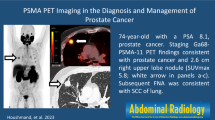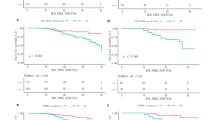Purpose:
To evaluate 5-year prostate-specific antigen (PSA) relapse-free survival of transperineal permanent seed implantation (TPSI) in 118 patients with “low-risk” prostate cancer, that means stage cT1c–T2a, Gleason Score < 7, and initial PSA value < 10 ng/ml.
Patients and Methods:
From 04/1999 to 06/2002, a total of 118 patients underwent a mono-TPSI, using ultrasound-based preplanning and intraoperative verification by both ultrasound and conventional fluoroscopy as well as postoperative CT planning. Patients were monitored during the 1st year in 3-month intervals, and in 6-monthly intervals from then onward. Biochemical failure was defined according to ASTRO criteria with three consecutive PSA rises observed from a posttreatment nadir PSA value. The median follow-up was 48.9 months (range: 37.0–80.2 months). 114 patients were eligible, four patients were lost to follow-up.
Results:
For the entire group, PSA relapse-free survival at 5 years was 94.7%, with six patients (5.3%) having a PSA relapse between 8 and 20 months after implantation. In the bNED patients (no biochemical evidence of disease), PSA values were < 0.2 ng/ml in 82.5% (94/114 patients), < 0.5 ng/ml in 13.2% (15/114 patients), < 1.0 ng/ml in 2.6% (3/114 patients), and < 1.5 ng/ml in 1.7% (2/114 patients). In summary, PSA values < 0.2 ng/ml, < 0.5 ng/ml and < 1.0 ng/ml occurred in 82.5%, 95.7% and 98.3%, respectively. Out of the six patients with recurrent disease, three had a local tumor recurrence only, and three developed distant metastases.
Conclusion:
In low-risk prostate cancer patients, TPSI with intraoperative ultrasound-based treatment planning and fluoroscopy leads to excellent local tumor control and PSA relapse-free survival.
Ziel:
Evaluation der Wirksamkeit einer transperinealen permanenten Seedimplantation (TPSI) bei 118 Patienten mit Prostatakarzinomen „niedrigen Risikos“ (cT1c–T2a, Gleason-Score < 7 und initialer PSA-Wert [prostataspezifisches Antigen] < 10 ng/ml).
Patienten und Methodik:
Von 04/1999 bis 06/2002 erhielten 118 Patienten eine alleinige TPSI. Die TPSI erfolgte mit Prä-, Online- und CT-Nachplan. Die Patienten wurden im 1. Jahr 3-monatlich und vom 2. bis 5. Jahr 6-monatlich nachuntersucht. Kriterien für das Vorliegen eines Tumorrezidivs waren drei konsekutive PSA-Anstiege (ASTRO-Kriterien) nach Erreichen des posttherapeutischen PSA-Nadirs. Die mediane Nachbeobachtungszeit betrug 48,9 Monate (37,0–80,2 Monate). 114 Patienten waren auswertbar, vier Patienten entzogen sich der weiteren Nachkontrolle.
Ergebnisse:
Für das gesamte Patientenkollektiv ergab sich ein PSA-freies Überleben nach 5 Jahren von 94,7%, sechs Patienten (5,3%) entwickelten ein PSA-Rezidiv in einem Intervall von 8–20 Monaten nach TPSI. Bei den bNED-Patienten („no biochemical evidence of disease“) betrugen die PSA-Werte < 0,2 ng/ml bei 82,5% (94/114 Patienten), < 0,5 ng/ml bei 13,2% (15/114 Patienten), < 1,0 ng/ml bei 2,6% (3/114 Patienten) und < 1,5 ng/ml bei 1,7% (2/114 Patienten). Demgemäß fanden sich PSA-Werte < 0,2 ng/ml, < 0,5 ng/ml und < 1,0 ng/ml bei 82,5%, 95,7% und 98,3% der Patienten. Von den sechs Patienten mit Tumorrezidiv kam es bei drei zu einem lokalen und bei drei zu einem systemischen Wiederauftreten der Erkrankung.
Schlussfolgerung:
Bei Patienten mit einem Prostatakarzinom „niedrigen Risikos“ führt die ultraschallgestützte und fluoroskopisch kontrollierte TPSI zu exzellenter lokaler Tumorkontrolle und PSA-freiem Überleben.
Similar content being viewed by others
Author information
Authors and Affiliations
Corresponding author
Rights and permissions
About this article
Cite this article
Block, T., Czempiel, H. & Zimmermann, F. Transperineal Permanent Seed Implantation of “Low-Risk” Prostate Cancer. Strahlenther Onkol 182, 666–671 (2006). https://doi.org/10.1007/s00066-006-1570-4
Received:
Revised:
Issue Date:
DOI: https://doi.org/10.1007/s00066-006-1570-4




